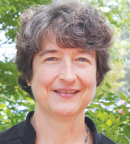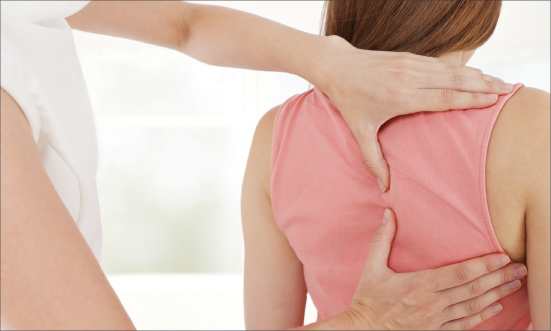Difficult-to-treat, cancer-related fatigue is a common, distressing clinical issue. It impedes daily activities, severely affecting patients’ quality of life. Compounding the problem is a lack of consensus on an effective pharmacologic intervention. Acupressure is a traditional Chinese medicine technique that involves stimulation of specific acupoints on the body or in the ear to relieve chronic pain symptoms, including those associated with cancer. In this article, Ms. Zick and Dr. Harris summarize the research on acupressure for managing cancer-related fatigue.

Suzanna M. Zick, ND, MPH

Richard E. Harris, PhD
Overview
MODERATE TO severe persistent cancer-related fatigue occurs in about 25% to 80% of people living with cancer1-3 and can last for as long as 10 years after the end of treatment. Yet it is often not assessed, has limited treatment options, and is associated with significant barriers to implementing current treatments.4-7 In contrast to the fatigue experienced by healthy people at the end of a long day, persistent cancer-related fatigue is defined by the National Comprehensive Cancer Network® (NCCN®) and used by the ASCO Clinical Practice Guidelines as “a distressing, persistent, subjective sense of physical, emotional, and/or cognitive tiredness or exhaustion related to cancer and/or cancer treatment that is not proportional to recent activity and significantly interferes with usual functioning.”4 Congruent with this definition, persistent cancer-related fatigue is associated with significant health issues, including higher rates of depression and anxiety,8 poor sleep,9 and decreased quality of life.10 Furthermore, sufferers of persistent cancer-related fatigue are often unable to perform their daily activities of living and/ or assist their family in these activities, leading to further physical and psychosocial problems.11
Causes of Cancer-Related Fatigue
THE CAUSES of persistent cancer-related fatigue are poorly understood, likely given the multiple interrelated factors in any given individual and because they are a combination of immune, muscular, endocrine, and neurochemical changes.12 The mechanisms underlying persistent cancer-related fatigue with the most evidence include elevated levels of proinflammatory cytokines (interleukin-6, tumor necrosis factor–alpha) and C-reactive protein in fatigued vs nonfatigued patients with cancer13-15; suppressed hypothalamic-pituitary-adrenal axis and consequent blunting of the stress response leading to both increased circulating cortisol and inflammation; and circadian rhythm disruption with fatigued patients with cancer and survivors having a flatter diurnal slope and a slower decline of evening cortisol.16,17
ACUPRESSURE BASICS
- Acupressure is a component of traditional Chinese medicine where a finger, thumb, or a device is used to stimulate—usually in a clockwise or counterclockwise circular motion—acupoints on the body.
- Acupressure can either be provided as a treatment by a traditional Chinese medicine practitioner; an acupuncturist; or a patient, who can be taught to self-administer the treatment.
- The number and location of acupoints being stimulated depend on the symptom or illness being treated. In clinical trials to treat cancer-related fatigue, 5 to 7 acupoints were stimulated for up to 3 minutes each.
Another emerging potential mechanism is dysfunctional activity in the brain, with fatigued breast cancer survivors having alterations in brain neurochemistry such as elevated excitatory neurotransmitters (ie, glutamate) within the posterior insula and disturbed functional connectivity to the default mode network, compared with the nonfatigued population.18,19 These changes in brain function and chemistry appear to be related to patients’ symptoms of poor sleep and fatigue.18
Acupressure for Cancer-Related Fatigue
ACUPRESSURE IS a component of traditional Chinese medicine where a finger, thumb, or a device is used to stimulate—usually in a clockwise or counterclockwise circular motion—acupoints on the body, or in the ear in the case of auricular acupressure. Acupoints are located throughout the body along meridians, and stimulation of these points is used to alleviate illness and improve symptoms such as fatigue. Acupressure can either be provided as a treatment by a traditional Chinese medicine practitioner; an acupuncturist; or a patient, who can be taught to self-administer the treatment. The number and location of acupoints being stimulated depend on the symptom or illness being treated. For example, in clinical trials to treat cancer-related fatigue, 5 to 7 acupoints were stimulated for up to 3 minutes each.20-29 Auricular acupressure involves placing small seeds on acupoints in the ear. These seeds are tapped in place, and patients are asked to rub or stimulate them throughout the day.

A total of 11 randomized controlled trials of acupressure for fatigue in 949 patients with cancer have been conducted to date.20-31 The majority of these studies have been conducted in the breast cancer population (n = 6,537 women),22-25,27,30 but trials have also been conducted in those with hepatocellular carcinoma (n = 1),21 lung cancer (n = 2),28,29 ovarian cancer (n = 1),31 and pediatric acute lymphocytic leukemia (n = 1).20 These studies are extremely heterogeneous differing not only in the patient population, but also in the control group (eg, sham acupressure, usual care, acupuncture), the duration and frequency of acupressure treatments, how and when fatigue is assessed, when acupressure to the cancer arch is administered, and in the acupressure intervention itself. For the latter, acupressure has been administered by a traditional Chinese medicine provider; self-administered; delivered as auricular acupressure; or combined with other therapies such as aerobic exercise, essential oils, and education. Also, with the exception of trials in breast cancer survivors (n = 288)25 and in acute lymphoblastic leukemia (n = 120),20 studies have been small feasibility assessments.

Jun J. Mao, MD, MSCE
Acupressure has been shown to be safe and acceptable to patients with cancer.20-31 Also, acupressure appears to affect significant improvements, on the order of 30% to 40%, in fatigue severity and interference compared with usual care, although fewer effects are typically seen with sham acupressure controls.20-31 However, given the high heterogeneity and the poor quality of some of the studies, the data need to be viewed with caution.
GUEST EDITOR
Integrative Oncology is guest edited by Jun J. Mao, MD, MSCE, Laurance S. Rockefeller Chair in Integrative Medicine and Chief, Integrative Medicine Service, Memorial Sloan Kettering Cancer Center, New York.Mechanistic studies indicate that acupressure may impact brain chemistry and connectivity, which was found to be different in the brains of fatigued cancer survivors than in nonfatigued cancer survivors, A relatively recent brain neuroimaging study found that 6 weeks of 2 distinct formulas (acupoints located in distinct areas of the body from one another) of once-daily self-acupressure in fatigued breast cancer survivors increased connectivity between the default mode network and different thalamus/brain stem areas related to sleep (for a relaxing acupressure formula) and alertness (for a stimulating acupressure formula). The authors suggested that different acupressure points may have specificity in relation to symptoms treated in fatigued patients with cancer.32
Closing Thoughts
FATIGUE CAN cause significant physical and emotional burdens on patients with cancer. Acupressure appears useful from a clinician’s perspective, as it is safe, affordable, and often does not require repeated patient-provider visits. As such, acupressure may have utility for cancer survivors with fatigue. ■
DISCLOSURE: Drs. Zick and Harris helped create an acupressure app called MeTime Acupressure. Dr. Harris is also a consultant or advisor to Pfizer Inc. and Aptinyx.
REFERENCES
1. Harrington CB, Hansen JA, Moskowitz M, et al: It’s not over when it’s over: Long-term symptoms in cancer survivors—A systematic review. Int J Psychiatry Med 40:163-181, 2010.
2. Minton O, Stone P: How common is fatigue in disease-free breast cancer survivors? A systematic review of the literature. Breast Cancer Res Treat 112:5-13, 2008.
3. Bower JE: Cancer-related fatigue—Mechanisms, risk factors, and treatments. Natl Rev Clin Oncol 11:597-609, 2014.
4. Bower JE, Bak K, Berger A, et al: Screening, assessment, and management of fatigue in adult survivors of cancer: An American Society of Clinical oncology clinical practice guideline adaptation. J Clin Oncol 32:1840-1850, 2014.
5. Bower JE, Ganz PA, Desmond KA, et al: Fatigue in long-term breast carcinoma survivors: A longitudinal investigation. Cancer 106:751-758, 2006.
6. Blaney JM, Lowe-Strong A, Rankin-Watt J, et al: Cancer survivors’ exercise barriers, facilitators and preferences in the context of fatigue, quality of life and physical activity participation: A questionnaire-survey. Psychooncology 22:186-194, 2013.
7. Holland JC, Andersen B, Breitbart WS, et al: Distress management. J Natl Compr Canc Netw 11:190-209, 2013.
8. Galiano-Castillo N, Ariza-Garcia A, Cantarero-Villanueva I, et al: Depressed mood in breast cancer survivors: Associations with physical activity, cancer-related fatigue, quality of life, and fitness level. Eur J Oncol Nurs 18:206-210, 2014.
9. Ancoli-Israel S, Liu L, Marler MR, et al: Fatigue, sleep, and circadian rhythms prior to chemotherapy for breast cancer. Support Care Cancer 14:201-209, 2006.
10. Wu HS, Harden JK: Symptom burden and quality of life in survivorship: A review of the literature. Cancer Nurs 38:E29-E54, 2014.
11. Hofman M, Ryan JL, Figueroa-Moseley CD, et al: Cancer-related fatigue: The scale of the problem. Oncologist 12(suppl 1):4-10, 2007.
12. O’Higgins CM, Brady B, O’Connor B, et al: The pathophysiology of cancer-related fatigue: Current controversies. Support Care Cancer. June 30, 2018 (early release online).
13. Bower JE, Ganz PA, Aziz N, et al: Fatigue and proinflammatory cytokine activity in breast cancer survivors. Psychosom Med 64:604-611, 2002.
14. Bower JE, Ganz PA, Aziz N, et al: Inflammatory responses to psychological stress in fatigued breast cancer survivors: Relationship to glucocorticoids. Brain Behav Immun 21:251-258, 2007.
15. Bower JE, Lamkin DM: Inflammation and cancer-related fatigue: Mechanisms, contributing factors, and treatment implications. Brain Behav Immun 30(suppl):S48-S57, 2013.
16. Weinrib AZ, Sephton SE, Degeest K, et al: Diurnal cortisol dysregulation, functional disability, and depression in women with ovarian cancer. Cancer 116:4410-4419, 2010.
17. Sephton SE, Lush E, Dedert EA, et al: Diurnal cortisol rhythm as a predictor of lung cancer survival. Brain Behav Immun 30(suppl):S163-S170, 2013.
18. Hampson JP, Zick SM, Khabir T, et al: Altered resting brain connectivity in persistent cancer related fatigue. Neuroimage Clin 8:305-313, 2015.
19. Zick SM, Zwickey H, Wood L, et al: Preliminary differences in peripheral immune markers and brain metabolites between fatigued and non-fatigued breast cancer survivors: A pilot study. Brain Behav Immun 8:506-516, 2014.
20. Bastani F, Khosravi M, Borimnejad L, et al: The effect of acupressure on cancer-related fatigue among school-aged children with acute lymphoblastic leukemia. Iran J Nurs Midwifery Res 20:545-551, 2015.
21. Lan SC, Lin YE, Chen SC, et al: Effects of acupressure on fatigue and depression in hepatocellular carcinoma patients treated with transcatheter arterial chemoembolization: A quasi-experimental study. Evid Based Complement Alternat Med. February 23, 2015 (early release online).
22. Molassiotis A, Sylt P, Diggins H: The management of cancer-related fatigue after chemotherapy with acupuncture and acupressure: A randomised controlled trial. Complement Ther Med 15:228-237, 2007.
23. Yeh CH, Chien LC, Lin WC, et al: Pilot randomized controlled trial of auricular point acupressure to manage symptom clusters of pain, fatigue, and disturbed sleep in breast cancer patients. Cancer Nurs 39:402-410, 2016.
24. Zick SM: Relaxation acupressure reduces persistent cancer-related fatigue. Evid Based Complement Alternat Med 165:1-11, 2011.
25. Zick SM, Sen A, Wyatt GK, et al: Investigation of 2 types of self-administered acupressure for persistent cancer-related fatigue in breast cancer survivors: A randomized clinical trial. JAMA Oncol 2:1470-1476, 2016.
26. Balk J, Day R, Rosenzweig M, et al: Pilot, randomized, modified, double-blind, placebo-controlled trial of acupuncture for cancer-related fatigue. J Soc Integr Oncol 7:4-11, 2009.
27. Zhang B, Dong JN, Sun P, et al: Effect of therapeutic care for treating fatigue in patients with breast cancer receiving chemotherapy. Medicine (Baltimore) 96:e7750, 2017.
28. Yorke J, Lloyd-Williams M, Smith J, et al: Management of the respiratory distress symptom cluster in lung cancer: A randomised controlled feasibility trial. Support Care Cancer 23:3373-3384, 2015.
29. Tang WR, Chen WJ, Yu CT, et al: Effects of acupressure on fatigue of lung cancer patients undergoing chemotherapy: An experimental pilot study. Complement Ther Med 22:581-591, 2014.
30. Xu J, Gu L, Qiao H: Effect of traditional Chinese and Western medicine joint exercise therapy on cancer-related fatigue after operation of mammary cancer. Zhong Guo Quan Ke Yi Xue 13:3225-3226, 2010.
31. Liu L, Rissling M, Neikrug A, et al. Fatigue and circadian activity rhythms in breast cancer patients before and after chemotherapy: A controlled study. Fatigue 1:12-26, 2013.
32. Harris RE, Ichesco E, Cummiford C, et al: Brain connectivity patterns dissociate action of specific acupressure treatments in fatigued breast cancer survivors. Front Neurol 8:298, 2017.

